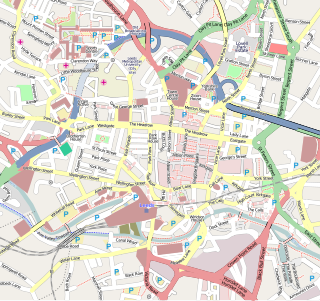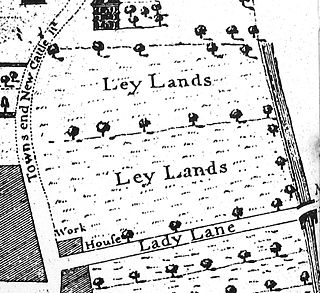
Vicar Lane is a street in the city centre of Leeds, a city in England.

Vicar Lane is a street in the city centre of Leeds, a city in England.
The street was first shown on a plan of 1560, with some buildings already lying on the street. The town's workhouse was built on its corner with Lady Lane in 1726, while at its junction with Kirkgate, there was an open area with pens for livestock taken to market. [1]
The road long marked the eastern edge of central Leeds, with back-to-back housing to its east. In 1857, Kirkgate Market was built, with its main frontage on Vicar Lane, and when in 1904 it was rebuilt, the opportunity was taken to widen the street. By 1909, it was regarded as one of the main shopping streets in the city. [1] Shops included the Willis Ludlow department store. [2] In 1930, a bus station was opened, serving routes to towns north of Leeds and on the coast, only closing in 1990. [3] In 1964, much of the street was made one-way, but in 2021 it reopened to buses and taxis in both directions. [4]

The road runs north from a crossroads with Kirkgate, continuing the line of New Market Street. On its west side, it has junctions with Fish Street, King Edward Street, The Headrow, Harrison Street, Merrion Street, and Merrion Place. On its east side, it has junctions with Ludgate Hill, Sidney Street, Eastgate, Lady Lane, North Court, and Templar Street. It ends at a major junction with the Leeds Inner Ring Road, where it merges with New Briggate, and the two continue together as North Street.
Listed buildings on the west side of the street include the early-19th century General Eliott pub, [5] early-20th century 49-51 Vicar Lane, [6] the Victoria Leeds complex of arcades, [7] and the Grand Arcade. [8] On the east side lie Kirkgate Market, [9] the early-20th century 50–56 Vicar Lane, [10] 58 Vicar Lane, [11] 60 and 62 Vicar Lane, [12] Wrays Buildings, [13] Coronation Buildings, [14] County Houses, [15] 90–94 Vicar Lane, [16] the early-19th century Templar Hotel. [17]

Shipley is a historic market town and civil parish in the City of Bradford, West Yorkshire, England.

Bramhope is a village and civil parish in the City of Leeds metropolitan borough, West Yorkshire, England, north of Holt Park and north east of Cookridge.

The Grand Theatre, also known as Leeds Grand Theatre and Leeds Grand Theatre and Opera House, is a theatre and opera house in Briggate, Leeds, West Yorkshire, England. It seats approximately 1,500 people.

The Merrion Centre is a shopping centre located in the Arena Quarter area of Leeds, West Yorkshire, England. Since opening in 1964, the centre has been owned and managed by Town Centre Securities. Originally open air, the centre had a roof installed during the 1970s.

Briggate is a pedestrianised principal shopping street in Leeds city centre, England. Historically it was the main street, leading north from Leeds Bridge, and housed markets, merchant's houses and other business premises. It contains many historic buildings, including the oldest in the city, and others from the 19th and early-20th century, including two theatres. It is noted for the yards between some older buildings with alleyways giving access and Victorian shopping arcades, which were restored in late 20th century. The street was pedestrianised in the late-20th century.

Kirkgate Market is a market complex on Vicar Lane in the city centre of Leeds, West Yorkshire, England. It is the largest covered market in Europe and a Grade I listed building. There are currently 800 stalls which attract over 100,000 visitors a week.

Leeds city centre is the central business district of Leeds, West Yorkshire, England. It is roughly bounded by the Inner Ring Road to the north and the River Aire to the south and can be divided into several quarters.

The Grand Arcade is a shopping arcade located on New Briggate in Leeds, West Yorkshire, England, and a Grade II listed building. It was built by New Briggate Arcade Company Ltd in 1897, with Smith & Tweedal as architects, in Renaissance style with Modern Style details.

Leeds Minster, also known as the Minster and Parish Church of Saint Peter-at-Leeds is the minster church of Leeds, West Yorkshire, England. It stands on the site of the oldest church in the city and is of architectural and liturgical significance. A church is recorded on the site as early as the 7th century, although the present structure is a Gothic Revival one, designed by Robert Dennis Chantrell and completed in 1841. It is dedicated to Saint Peter and was the Parish Church of Leeds before receiving the honorific title of "Minster" in 2012. It has been designated a Grade I listed building by Historic England.

Victoria Leeds is a shopping district and leisure area in central Leeds, comprising the 1990 Victoria Quarter, an arcaded complex of restored 19th-century and contemporary shopping arcades, and the 2016 Victoria Gate development. Notable for its role in the regeneration of Leeds' city centre, and a programme of restoration and reuse which included commissioning the largest work of stained glass work in Europe, designed by artist Brian Clarke, to cover the newly pedestrianised Queen Victoria Street, the 1990 scheme created a covered retail district of linked arcades. In 2016, the Victoria Quarter was merged with the newly built Victoria Gate complex to form the largest premium retail and leisure venue in Northern England. The district includes a casino and major stores such as Harvey Nichols and John Lewis and Partners.

The architecture of Leeds, a city and metropolitan borough in West Yorkshire, England, encompasses a wide range of architectural styles and notable buildings. As with most northern industrial centres, much of Leeds' prominent architecture is of the Victorian era. However, the City of Leeds also contains buildings from as early as the Middle Ages such as Kirkstall Abbey, one of Britain's best preserved ruined Cistercian monasteries, as well as examples of 20th century industrial architecture, particularly in the districts of Hunslet and Holbeck.

The Leylands was an area of Leeds, north of the city centre and west of Mabgate. John Cossins' 1726 Plan of Leedes shows two fields marked Ley Lands north of Lady Lane and west of the Sheepscar Beck which correspond to the area.

l

John Wormald Appleyard was a British sculptor and monumental mason based in Leeds, West Yorkshire, England.
City and Hunslet is a ward in the metropolitan borough of the City of Leeds, West Yorkshire, England. It contains over 400 listed buildings that are recorded in the National Heritage List for England. Of these, eight are listed at Grade I, the highest of the three grades, 30 at Grade II*, the middle grade, and the others are at Grade II, the lowest grade.

Kirkgate is a street in the city centre of Leeds, in England.

Boar Lane is a street in the city centre of Leeds, in England.

The Templar Hotel is a historic public house located on the corner of Templar Street and Vicar Lane in the city centre of Leeds, West Yorkshire, England. It was listed at Grade II by Historic England in 2019 following a campaign by Leeds Civic Trust, due to its many original 19th and 20th century external and interior features. The ground floor is clad with distinctive green and cream Burmantofts faience tiling with stained glass windows.